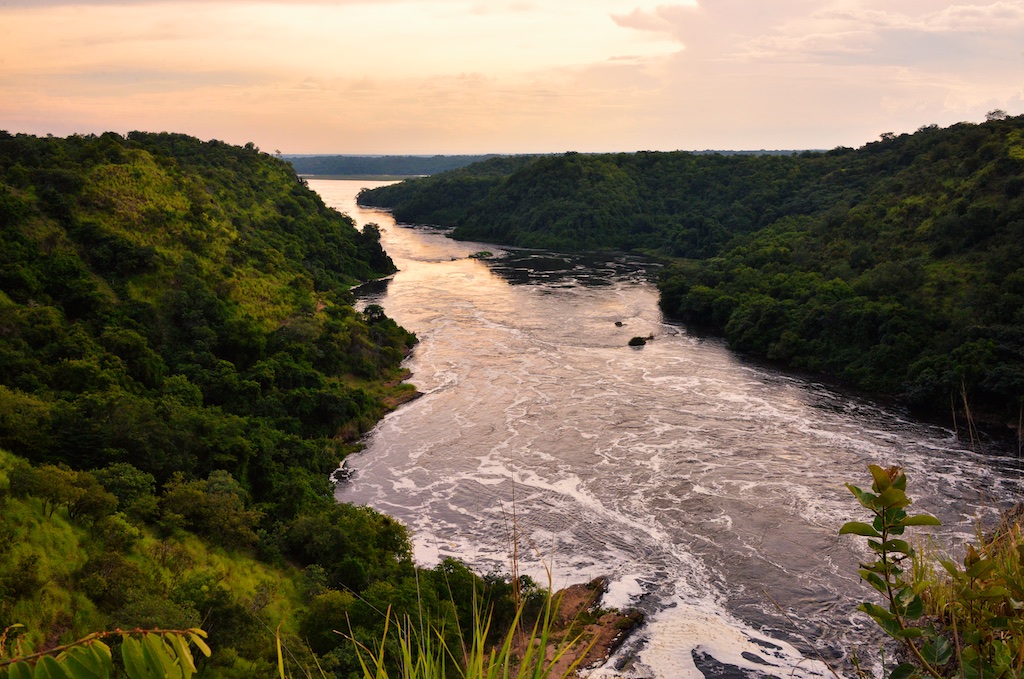 The Nile is commonly known as the longest river in the world (6,853 kilometers), and a source of sustenance for countless ancient and modern civilizations. However, not many people know a great deal about its course, mythology, and history. Therefore, I would like to explore these aspects about this famous river in detail in order to educate readers.
The Nile is commonly known as the longest river in the world (6,853 kilometers), and a source of sustenance for countless ancient and modern civilizations. However, not many people know a great deal about its course, mythology, and history. Therefore, I would like to explore these aspects about this famous river in detail in order to educate readers.
There is some debate about where the original source of the river is. The tributaries of Kagera River in Burundi, such as Ruvyironza or the Nyabarongo, are feeder rivers that connect near Rusumo Falls on the Rwanda-Tanzania border (BBC News). These feeder rivers go into Lake Victoria, which is considered by many as the source of the Nile (McLeay, Cam). According to LiveScience, “Flowing northward through the tropical climate of eastern Africa and into the Mediterranean Sea, the river passes through 11 countries: Tanzania, Uganda, Rwanda, Burundi, the Democratic Republic of the Congo, Kenya, Ethiopia, Eritrea, South Sudan, Sudan and Egypt” (Pedersen, Traci). Stretching through these nations, this great river has created and sustained civilizations for eons.
Since this river has been such a prominent part of the history of so many nations, mythology has emerged about it. Egyptians have made the most mythology about the Nile. LiveScience says that, “In some myths, the Nile was considered a manifestation of the god Hapi who blessed the land with abundance, according to the Ancient History Encyclopedia. Isis, the goddess of the Nile and the “Giver of Life,” was believed to have taught the people how to farm and work the land. The water god Khnum, who ruled over all forms of water, even the lakes and rivers in the underworld, was believed to be in charge of the amount of silt that flooded the river banks every year. In later dynasties, Khnum branched out to become the god of rebirth and creation as well” (Pedersen, Traci). In each of the 11 countries that the Nile has coursed through, mythology has been created. A whole book could be written about it, and many have written books on this subject.
Now that we have gone over the mythology of the Nile, let us look into the history of the Nile. According to the Ancient History Encyclopedia, “Permanent settlements gradually rose along the banks of the river beginning c. 6000 BCE and this was the beginning of Egyptian civilization and culture which became the world’s first recognizable nation state by c.3150 BCE” (Mark, Joshua J.). So, in a sense, the history of the Nile is the story of modern civilization. USHistory.org explains more about the beginning of this first nation, “Over time, however, despite being in the midst of desert surroundings, people discovered that the Nile River provided many sources of food. Along the river were fruit trees, and fish swam in the Nile in great numbers. Perhaps most importantly, they discovered that, at the same time each year, the Nile flooded for about six months. As the river receded, it deposited a rich, brown layer of silt that was suitable for growing wheat, beans, barley, or even cotton” (Independence Hall Association). This gave the inhabitants near the Nile a boost in learning about agriculture and developing farming methods to create a powerful nation.
The Nile River is famous for a number of reasons. Not only did it foster many ancient civilizations, including the first developed nation, it has garnered a great many mythological stories about it and connects many cultures from 11 countries. Without the Nile, the progress of worldwide civilizations would not have been so quick and would not have developed in the way that it did. Whether or not we believe in the mythology surrounding the Nile, it has a god-like importance in the history of modern civilization.
References
“Team Reaches Nile’s ‘True Source.”’ BBC News. 31 March 2006. Archived from the original on 1 June 2013.
McLeay, Cam (2 July 2006). “The Truth About the Source of R. Nile.” New Vision. Archived from the original on 9 April 2011.
Pedersen, Traci. “The Nile: Longest River in the World.” LiveScience, Purch, 29 Nov. 2016, www.livescience.com/57023-nile-river-facts.html.
Mark, Joshua J. “Nile.” Ancient History Encyclopedia, Ancient History Encyclopedia, 15 May 2018, www.ancient.eu/nile/.
“Life along the Nile.” Ushistory.org, Independence Hall Association, www.ushistory.org/civ/3a.asp.
Sign up and we’ll send you ebook of 1254 samples like this for free!
- 80+ essay types
- 1000+ essay samples
- Pro writing tips
Previous answers to this question
This is a preview of an assignment submitted on our website by a student. If you need help with this question or any assignment help, click on the order button below and get started. We guarantee authentic, quality, 100% plagiarism free work or your money back.
 Get The Answer
Get The Answer